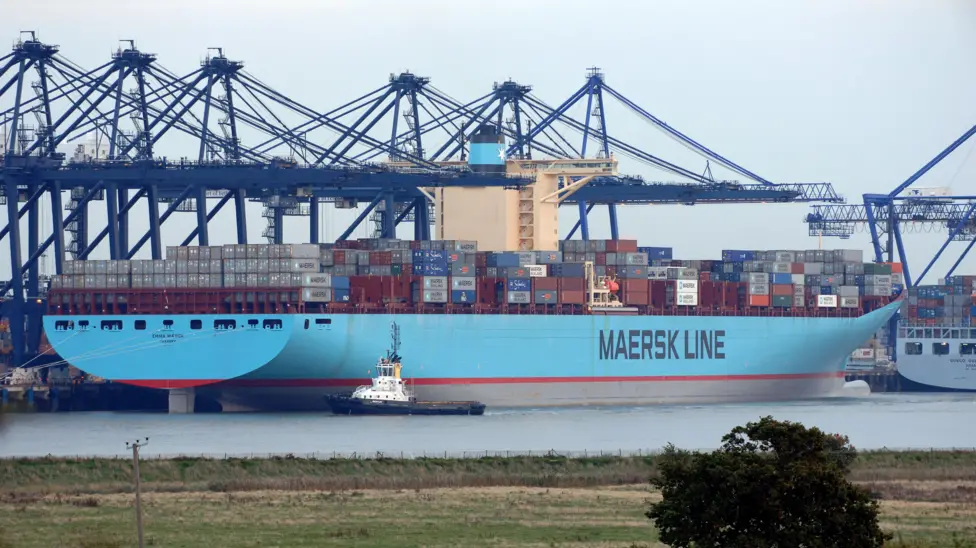Tel: 0161 652 3443 | Email: sales@aeronacca.co.uk
The Impact of Maersk’s Decision to Shift Operations from Felixstowe to London Gateway
In what could be a significant development for the UK’s shipping and logistics sector, Maersk has announced that it will cease operations at the Port of Felixstowe for its larger vessels.
This change starts in February 2024, with the decision following a comprehensive review of its Asia-Europe shipping routes.
During this review, Maersk determined that the London Gateway, located on the Thames Estuary in Essex, is the “most optimal port to serve our customers” in the UK.
Currently, the Port of Felixstowe accommodates approximately 2,000 ships annually, handling about four million containers, measured in 20-foot equivalent units (TEUs).
Each week, the Suffolk port sees around six giant container ships on the Asia-Europe route, with two currently operated by Maersk.
This operational shift could have profound implications for the port, the local economy and the logistics industry in the region.
Economic Implications for Felixstowe
Felixstowe’s port is not just a crucial entry point for goods arriving in the UK, it also plays a vital role in supporting the local economy.
With about 2,250 individuals employed at the port, the loss of the Maersk services could lead to significant job losses in various sectors, including trucking, warehousing and distribution.
Mark Ling, agency director for ICE Transport haulage, highlighted the potential job transfer from Felixstowe to London Gateway, indicating that this shift is not just about logistics, but also about livelihoods.
Ling noted that while Felixstowe remains a robust port, ongoing issues with local transport infrastructure have hindered its competitiveness.
He pointed out challenges such as the frequent closures of the A14 Orwell Bridge due to adverse weather conditions, delays related to accidents and the stagnant proposal for an Ipswich northern bypass.
The limitations of a single-track railway between Felixstowe and Ipswich also poses logistical constraints that have increasingly frustrated shipping companies.
The Response from Industry Stakeholders
Industry figures have echoed the sentiment of disappointment regarding Maersk’s announcement.
Peter Wilson, managing director of Ipswich logistics firm Cory Brothers, said that while the news was anticipated, it still came as a surprise.
The shift of Maersk’s operations not only influences the immediate economic landscape of Felixstowe but also reflects broader trends within the shipping industry and the importance placed on efficient port operations.
As Maersk transitions its two giant container ships from Felixstowe to London Gateway, it’s crucial to understand that this is not merely a logistical move.
It signifies a pivotal shift in the dynamics of import and export in the UK.
Industries reliant on these shipping routes will need to adapt quickly to the changes, potentially facing increased costs associated with longer transport routes to reach destination ports.
Future of Felixstowe
The loss of Maersk’s larger vessels is undoubtedly a setback for the Port of Felixstowe, which has long been a cornerstone of the UK’s import capabilities.
Experts are keen to emphasise however, that this change could also serve as a wake-up call. There is an urgent need for the government and local authorities to address infrastructural issues to enhance the efficiency of port operations.
As Ling noted, “We’ve spent 40 years and we haven’t moved forwards in terms of our infrastructure and if you don’t move forward, other people will take your business.”
Maersk’s decision to consolidate its operations at London Gateway poses significant challenges for the Port of Felixstowe, its workforce and the broader logistics sector in the UK.
While the immediate impacts may be detrimental, this development highlights the critical necessity for investment in infrastructure to secure the port’s future competitiveness.
As the logistics landscape continues to evolve, stakeholders will need to work collaboratively to ensure that Felixstowe remains a vital hub for international trade.

